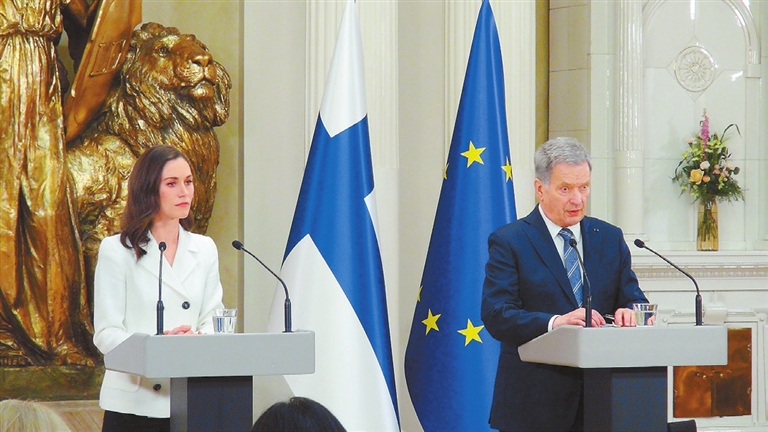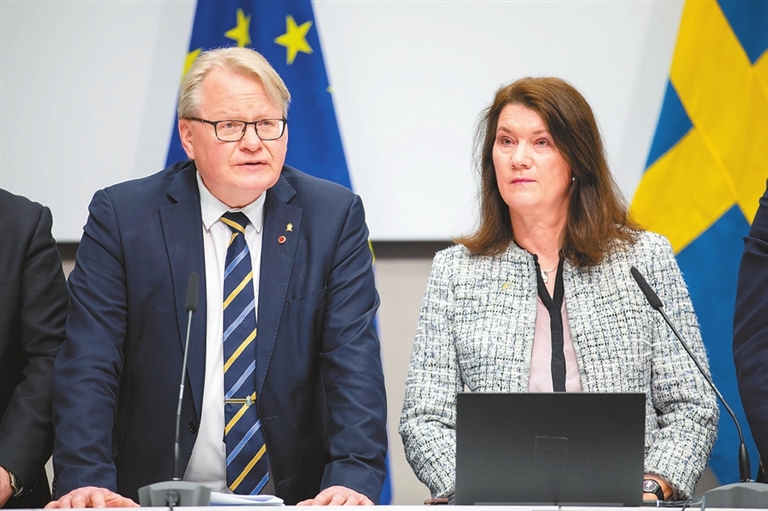

THE Finnish government Sunday announced that it has officially decided to apply for a membership of the North Atlantic Treaty Organization (NATO). At a joint press conference with Prime Minister Sanna Marin in Helsinki, Finnish President Sauli Niinisto said the country’s leadership has decided to join the military alliance. “This is a historic day,” Niinisto said, adding that the change is not targeted against anyone. Marin said a NATO membership would strengthen Finland’s security, which is the most important aspect, but as a member of NATO, Finland would also assume its responsibilities. The leaders said the president and Ministerial Committee on Foreign and Security Policy had completed a report on Finland’s joining of NATO. The report was submitted to a government council meeting later Sunday, and was presented to parliament for review it yesterday. Finnish Foreign Minister Pekka Haavisto told reporters that the written application will be officially submitted by the country’s ambassador to NATO headquarters in Brussels, which will “most likely” take place May 18. Finland’s move has angered the Kremlin, which insists the Nordic nations have nothing to fear and it promised reprisals. On Saturday, during a phone call with the Finnish president, Russian President Vladimir Putin said Finland’s rejection of the traditional policy of military neutrality would be a mistake, and the changes in foreign policy may have a negative impact on relations with Russia. Russia has already pulled the plug on electricity supplies to Finland, with whom it shares a 1,340-kilometer border, the longest of any European Union member. Sweden followed suit as public support for NATO membership has grown amid security concerns. Sweden’s ruling Social Democratic Party said Sunday that they support the country’s application to join the NATO. “The party board has, at its meeting May 15, decided that the party will work toward Sweden applying for membership in NATO,” the leadership said in a statement. Following internal debates over the past week among the leadership of the Social Democrats, the biggest party in every election for the past century, Swedish Prime Minister Magdalena Andersson said NATO entry was “the best thing for the security of Sweden and the Swedish people.” “Non-alignment has served us well, but our conclusion is that it will not serve us as well in the future,” she said. “Today the Swedish Social Democratic Party took a historic decision to say yes to apply for a membership in the NATO defence alliance,” Swedish Foreign Minister Ann Linde tweeted. Foreign ministers from NATO’s 30 member states were holding two days of talks last weekend in Berlin that are focused on the two Nordic countries’ membership bids. NATO’s Deputy Secretary-General Mircea Geoana said Sunday that he was confident that the alliance can overcome objections by Turkey and quickly admit Finland and Sweden. Many allies at the Berlin meeting backed the two countries, stressing the need for swift ratification of their membership bids, which typically take up to a year. After Sunday’s meeting, U.S. Secretary of State Antony Blinken voiced confidence that Sweden and Finland would join NATO once they formally apply. “The United States would strongly support the NATO application by either Sweden or Finland should they choose to formally apply to the alliance,” Blinken told reporters in Berlin. Dmitry Medvedev, deputy chairman of Russia’s Security Council, said Saturday that should Sweden and Finland join NATO, Russia would have to strengthen its land, naval and air forces in the Baltic Sea. Medvedev also explicitly raised the nuclear threat by saying that there could be no more talk of a “nuclear free” Baltic — where Russia has its Kaliningrad exclave sandwiched between Poland and Lithuania. “There can be no more talk of any nuclear-free status for the Baltic — the balance must be restored,” said Medvedev. Meanwhile, NATO and the United States said Sunday that they were confident that Turkish concerns would not hold up bids by Finland and Sweden to join the Western military alliance in response to Russia’s “special military operation” in Ukraine. Turkish President Recep Tayyip Erdogan on Friday said Turkey did not have a “positive opinion” on Finland and Sweden joining NATO and accused Scandinavian countries of harboring outlawed Kurdish militants. On the sidelines of a meeting of NATO foreign ministers in Berlin, Ankara said it wanted the two countries to halt support for Kurdish militant groups that have a presence on their territory, and lift bans on some sales of arms to Turkey. “I’m confident that we will be able to address the concerns that Turkey has expressed in a way that doesn’t delay the membership,” NATO Secretary-General Jens Stoltenberg said. U.S. Secretary of State Antony Blinken declined to go into details of closed-door conversations in Berlin but echoed Stoltenberg’s position. “I’m very confident that we will reach a consensus on that,” Blinken told reporters, adding that NATO was “a place for dialogue.” Any decision on NATO enlargement requires approval by all 30 allies and their parliaments. (CGTN) | 
